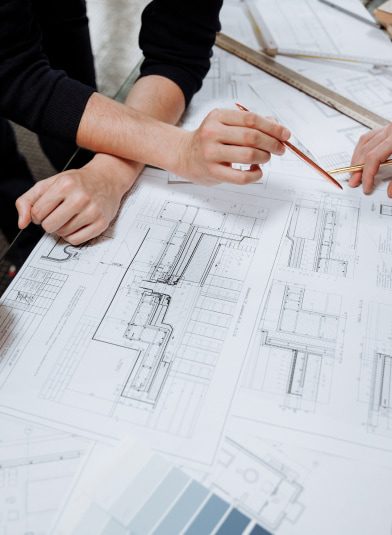Verifying and Documenting Facility Systems
Commissioning Services and Management
Our commissioning activities generally entail participation in the design, building, and starting stages of the project. Our commissioning specialists contribute to the accomplishment of a project and operate as a bridge for communication and problem-solving among all parties by actively engaging throughout the course of a project as a strong owner-advocate.


At its simplest, commissioning (Cx) is a process for verifying that you get what you pay for — trust, but verify.
But more broadly stated, commissioning processes allow a facility owner to document that systems work, materials are as expected, and overall project performance meets defined objectives and criteria.
Our commissioning professionals focuses on your facility’s design priorities. We achieve project goals. Our experience covers commissioning commercial real estate and industrial installations.
New construction, recommissioning, and uncommissioned facilities can be commissioned (retro-commissioning). It applies to HVAC, controls, electrical, building envelopes, renewable electricity, and unconventional systems like information technology (packaging lines, wastewater treatment and power turbines).
We know how commissioning fits into sustainable design and how to get mandatory and enhanced commissioning credits from the U.S. Green Building Council’s Leadership in Energy and Environmental Design (LEED) programme.

- Commissioning Services
Our commissioning efforts typically include involvement across all project phases — design, construction, and startup. By actively participating throughout the life of a project as a strong owner-advocate, our commissioning professionals contribute to the project’s success and serve as a conduit of communication and problem-solving among all parties.
Commissioning is a systematic process of verifying and documenting that your facility and all of its systems and assemblies are planned, designed, installed, tested, operated, and maintained to your project requirements. Our goal is to turn over a building that delivers or exceeds the performance and energy savings promised by its design.
Ideally, the commissioning process begins before the design phase, continues into the warranty period for a minimum of one year after construction, and prepares your operations personnel to take on the job. Our commissioning services can be provided independently or bundled with our full spectrum of planning, design, and construction services.

30-story office tower (2018-2019)


train station renovation (2016-2017)
- Recommissioning services

Commissioning is not restricted to newly built structures. Leadership in Energy and Environmental Design (LEED) existing building certification can be obtained by maximising the performance of an existing building. It can also function as a checkup for your facilities, ensuring that their systems are operating in accordance with your current standards.
Our commissioning specialists identify any regions of “drift” — deviations from the intended state — and return the structure to its optimal track. Our recommissioning experience encompasses more than 25 million square feet of facility space. Our staff will typically repeat the first commissioning process and continue to monitor ongoing performance.
When a building has been delivered utilising the commissioning procedure, it is recommissioned. This may be a planned recommissioning produced as part of a continuous commissioning process, or it may be necessitated by a change in usage, operational issues, or other requirements. Preferably, a strategy for recommissioning is established as part of the initial commissioning process for a new facility or the retro-commissioning process for an existing building. The same systematic verification and documentation of your facilities and systems is provided.
- Retro-Commissioning services
Your older facilities don’t have to miss out on the efficiencies and savings that come with new construction. We can help you improve the performance of your building’s systems without you having to buy a new building. This is called “retro-commissioning.”
Retro-commissioning is when the commissioning process is used on an already-built facility that has never been commissioned before. It includes evaluating, testing, adjusting, and fixing building systems so that energy and resources are saved, comfort is improved, productivity is increased, and operations and maintenance procedures are improved to meet all of the owner’s current facility needs.
A retro-commissioned property can also add value beyond its efficiency measures. Buildings that have been retro-commissioned can be more comfortable and retain occupants better. They can also better support increased worker productivity.
LIU construction (2015-2019)

you asked we answer
What is a commissioning process?
The commissioning process is the integrated application of a set of engineering techniques and procedures to check, inspect, and test every operational component of the project—from individual functions such as instruments and equipment, up to more complex entities such as subsystems and systems.
What are the types of commissioning?
- Commissioning or New Construction Commissioning Generally, the term “commissioning” refers to the process of commissioning a building that is newly constructed or in the design and construction phases.
- Re-commissioning.
- Retro-commissioning.
- Continuous Commissioning.
What is a benefit of commissioning?
Building commissioning provides appreciable and calculable benefits to building developers/owners, occupants, construction and design teams, and ultimately our nation.
Is commissioning required for LEED or any other green building rating system?
Commissioning is a prerequisite in the Energy and Atmosphere (EA) section of the LEED manual, therefore it is a requirement. The USGBC refers to this prerequisite as Fundamental Commissioning. There are also two additional points that can be earned by satisfying the requirements of Energy and Atmosphere (EA) Credit 3 for Enhanced Commissioning.
Why commission a building?
The objective of commissioning is to turnover a building that operates the way the owner originally intended, minimize call-backs for the contractor, maximize operational efficiency and training the operations staff in the proper operation of the facility. In some jurisdictions, commissioning is required to meet code requirements. Commissioning also reduces construction costs by minimizing design errors and construction rework, extending equipment life and improving productivity of occupants through increased indoor air quality, lower noise, and better lighting.
What is a Commissioning Specialist and why it. is important to have one?
A Commissioning Provider is an independent third-party engineer that is typically contracted to the owner of the building that leads, schedules and coordinates the commissioning effort from the design phase through occupancy. It is important to have a Commissioning Provider, as someone who is looking out for the best interest of the building owner and ensuring systems are installed and function to a level that meets the owner’s project requirements.
What guidelines govern the commissioning?
ASHRAE Guideline 0-2019, The Commissioning Process, is the most widely recognized commissioning guideline, however, other governing agencies such as the Associated Air Balance Council Commissioning Group (ACG), and the Building Commissioning Association (BCxA) have published guidelines related to commissioning as well. In some jurisdictions, such as California, commissioning is required by building code (Title 24) for buildings of a certain size and complexity.
Are certifications required for commissioning specialists?
No, however, a commissioning provider must have demonstrable experience providing building commissioning services in order to earn certain commissioning certifications. Certification organizations include the Building Commissioning Association (BCxA), the American Society of Heating, Refrigeration and Air Conditioning Engineers (ASHRAE), the Associated Air Balance Council’s Commissioning Group (AGC), the Association of Energy Engineers (AEE) and the University of Wisconsin’s Department of Engineering Professional Development.
Excellence in Commissioning Buildings for the Spaces We Share
CEO, BEYOND SMART CITIES
"Beyond Smart Cities is a privately held company that is entirely dedicated on whole-building commissioning. As a young, growing startup, it has the solid leadership foundation required to drive and build interest in the field of commissioning and sustainable technology development."


Skilled and experienced Building Commissioning for the Places We Gather
To help building commissioning specialists at all stages of their careers keep learning, we offer the courses at Learn From Beyond Smart Cities . This is a place where they can use the training, tools, certifications, and resources they need to be the best in their field. Through online and in-person training, webinars, and local and national events, the Learn From Beyond Smart Cities contributes to the maintenance and advancement of the commissioning standards that make our buildings safe and resilient.

